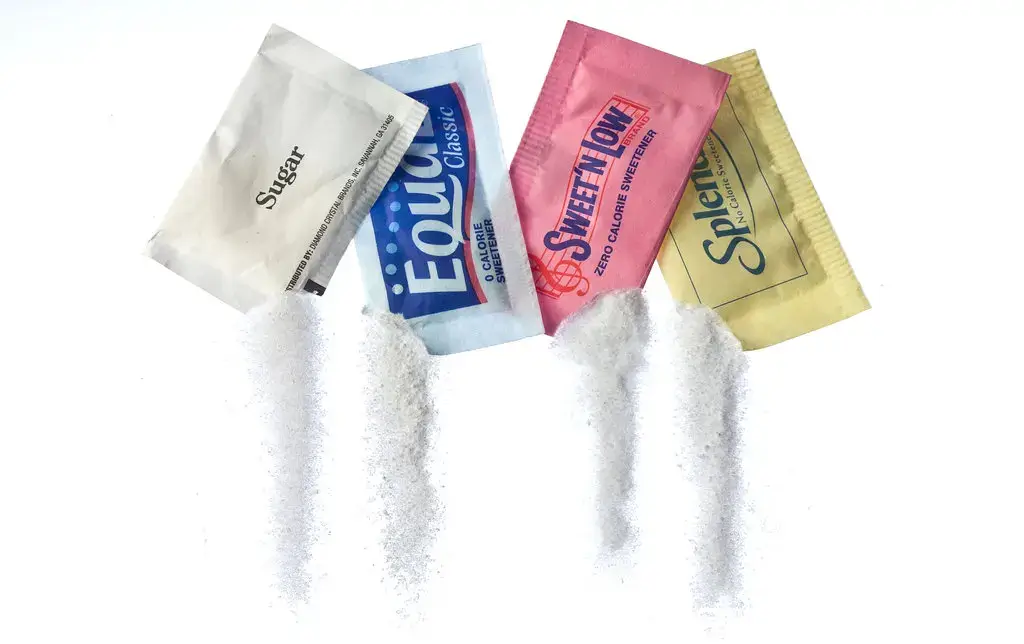By: Amie Dahnke | The Epoch Times
More people are turning to artificial sweeteners in lieu of sugar in an attempt to reduce their sugar intake to manage their weight and conditions like Type 2 diabetes. However, sugar alternatives can come with their own downsides, and some may cause more problems than they solve.
Neotame, a newer type of artificial sweetener used in things like soft drinks, cakes, and chewing gum can damage the intestine and cause health issues like irritable bowel syndrome (IBS) and sepsis, according to a new in vitro study published in the Frontiers in Nutrition.
What Is Neotame?
Neotame (brand name Newtame) is an artificial sweetener produced by NutraSweet, Co. It is around 8,000 times sweeter than table sugar and 40 times sweeter than aspartame, another artificial sweetener made by the same manufacturer. It was developed in the 1990s as a derivative of aspartame and was expected to be the sweetener’s potential successor. It received approval for use in food by the U.S. Food and Drug Administration (FDA) in 2002 and by the European Union in 2010.
Researchers from Anglia Ruskin University in the United Kingdom are the first to demonstrate that neotame can cause healthy bacteria in the gut to become diseased and damage the thin lining of the intestine to the point that it causes the death of tissue cells.
When the intestinal lining breaks down, the gut wall becomes more susceptible to harmful bacteria, such as E. coli and E. faecalis.
“There is now growing awareness of the health impacts of sweeteners such as saccharin, sucralose and aspartame, with our own previous work demonstrating the problems they can cause to the wall of the intestine and the damage to the ‘good bacteria’ which form in our gut,” senior author Havovi Chichger, associate professor in biomedical science at Anglia Ruskin University, said in a press release.
Ms. Chichger stressed the importance of studying the health effects of new sweeteners, especially because they are becoming increasingly popular as alternatives to sugar for weight loss and diabetes management.
Neotame Joins List of Artificial Sweeteners With Questionable Health Benefits
While some studies have touted the potential benefits of artificial sweeteners for promoting weight loss and helping people with glucose intolerance and Type 2 diabetes manage their conditions, others have linked artificial sweeteners with some adverse health effects.
In July 2023, the International Agency for Research on Cancer (IARC) classified aspartame as possibly carcinogenic to humans.
“The assessments of aspartame have indicated that, while safety is not a major concern at the doses which are commonly used, potential effects have been described that need to be investigated by more and better studies,” Dr. Francesco Branca, director of the Department of Nutrition and Food Safety at the World Health Organization (WHO), said in a WHO press release.
The Anglia Ruskin University team noted that other artificial sweeteners have the potential to wreak havoc on the gut. Ms. Chichger’s previous research suggests that acesulfame potassium, aspartame, sucralose, and saccharine have similar effects on the microbiota as neotame.
“This may lead to a range of potential health issues including [diarrhoea], intestinal inflammation, and even infections such as [sepsis] if the bacteria were to enter the blood stream [sic],” she said. “Understanding the impact of these pathogenic changes occurring in the gut microbiota is vital. Our findings also demonstrate the need to better understand common food additives more widely and the molecular mechanisms underlying potential negative health impacts.”
Please send this article to a loved one.
* * *
NEXT UP!
Top 4 Heart-Healthy Fruits Enhance Cardiovascular Protection
Fruit is fresh, delicious, and rich in vitamins, minerals, and antioxidants, promoting overall health. In this article, we will introduce four fruits—blueberries, cherries, mulberries, and raspberries—that possess anti-aging and heart-protective properties. These fruits reduce the risk of heart disease and offer various additional health benefits.
Blueberries
The nutritional value of blueberries is exceptionally high and contributes to the prevention of cardiovascular diseases. Research has found that blueberries exhibit anti-inflammatory and antioxidant effects, as well as benefits for vascular and glucoregulatory function (blood sugar regulation). Eating one-third of a cup of cup of blueberries daily can reduce the risk of cardiovascular diseases, Type 2 diabetes, and all-cause mortality.
* * *
READ MORE: 3 Expert Tips For Kidney Health: Promoting Longevity & Well-Being
Awareness! A Handful of Nuts Per Day Could Keep Heart Disease Away
Telegram: Stay connected and get the latest updates by following us on Telegram!
We’d love to hear from you! If you have a comment about this article or if you have a tip for a future Collective Spark Story please let us know below in the comment section.

